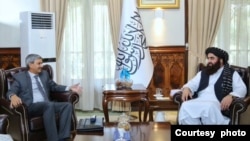Just two weeks after senior Indian diplomat J.P. Singh visited Kabul to meet with Taliban officials, a senior U.S. official landed in New Delhi to discuss Afghanistan.
Thomas West, the U.S. special representative for Afghanistan, urged Indian Foreign Secretary Vinay Kwatra to develop “a unified diplomatic approach in support of collective interests” in Afghanistan.
Unlike India, the United States has severed diplomatic ties with Kabul since the United States’ withdrawal from war-torn Afghanistan in 2021.
Washington maintains a policy of sanctions and isolation toward Taliban leaders.
Some analysts criticize that approach as ineffective, but U.S. officials maintain there will be no change until the Taliban reverse their bans on women's education and work and form a more inclusive government.
“The United States is going to continue to pursue policies in Afghanistan that protect our national interests and support the Afghan people,” a State Department spokesperson wrote to VOA.
India takes a different approach.
It views the Taliban as having brought a measure of stability to Afghanistan after 20 years of civil war, according to Rustam Shah Mohmand, a former Pakistani ambassador to Kabul.
“India eyes Afghanistan’s mineral wealth, and it wants transit access for trade and energy to Central Asia,” Mohmand told VOA.
In the meeting with Amir Khan Muttaqi, the Taliban's acting foreign minister, Singh and other Indian delegates also talked about “enhancing trade via Chabahar port,” according to a statement by the Taliban foreign ministry. Chabahar is a seaport in southeastern Iran. India has hoped to use the port to establish a trade route.
The U.S. has no such interest.
However, the State Department spokesperson expressed respect for India's need to pursue its national interests by engaging with the Taliban.
Counterterrorism
Terrorism threats emanating from Afghanistan have long been a primary concern for the U.S. and India.
U.S. officials frequently warn the Taliban against harboring al-Qaida and other militant groups that could endanger U.S. interests.
Similarly, New Delhi fears groups such as Lashkar-e-Taiba and their alleged acts of terrorism against India.
The Taliban maintain that they do not, and will not, allow any group to use Afghan territory to threaten other countries.
“While both Washington and New Delhi claim to share an interest in countering radicalization, neither of them has crafted policies toward countering this phenomenon,” said Raghav Sharma, a professor of international affairs at India’s O.P Jindal Global University.
Despite its geographical distance, the U.S. relies on "over the horizon" capabilities such as drones and satellite imagery to counter terrorism threats in Afghanistan, according to U.S. officials.
Lacking comparable resources, India chooses to directly engage with the Taliban to mitigate potential security risks emanating from Afghanistan.
Regional interests
Over the past two years, the U.S. has largely focused its public diplomacy on Afghan women’s rights, criticizing the Taliban for their misogynistic policies.
Countries surrounding Afghanistan, however, have taken a more pragmatic approach, maintaining diplomatic and trade relations despite concerns about human rights.
While no country has officially recognized the Taliban government, the Islamic Emirate of Afghanistan (the Taliban's official name) has diplomatic missions in 38 countries.
That includes close U.S. allies such as Italy, Japan, Norway and Turkey, which have kept diplomats in Kabul.
U.S. officials say there is a broad international consensus against recognizing the Taliban government.
The Taliban accuse the U.S. of using its leverage to deny them Afghan representation at the United Nations and other international platforms.
“India is likely to grant de facto recognition to them [the Taliban] by accrediting their diplomats” after India holds general elections in April, Sharma told VOA. This would put the country “broadly in line with actions of most major actors in the region.”
Amid growing tensions between Pakistan and the Afghan Taliban, India sees an opportunity to be on good terms with Kabul. India and Pakistan have a long history of strained relations, dating back to the partition of Indian subcontinent in 1947.






